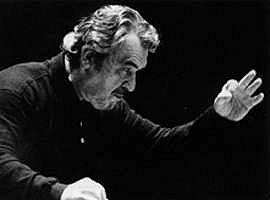S & H Concert Review
Schubert, Brahms, Sally Mathews (Sop), Christopher Maltman (Bar), BBC Symphony Orchestra & Chorus, Walter Weller, Barbican, 12 April 2003 (AR)
Schubert’s ‘Unfinished’ 8th Symphony is played far too often, and too often played badly: such is the fate of popular warhorses in the concert repertoire. However, under Walter Weller’s sensitive baton we experienced an ear-opening interpretation. From the very opening, darkly brooding ‘cello line, it was obvious this was certainly not just another run-through. From the outset, Weller had orchestra and audience in the palm of his hand, such was the concentrated tension he poured into his conducting.What struck me about this movement were the tiniest orchestral details Weller conjured up, so often skimped by other conductors: notably, a stark and deep viola line, missing in lesser performances. The ‘cellos and double basses also revealed textural details I had seldom heard before, whilst the playing of the horns was simply divine, producing a velvety rich, dark tone.
In the second movement the strings took on a strident, nervous urgency contrasting well with the woodwind’s incisive dissonance. Timpanist John Chimes played with great style and assurance, letting us hear every note Schubert wrote with sharp clarity.
Weller’s tempi throughout both movements were broad and never dragged and he blended one movement into the other with a seamless ease: this was indeed a paradigm performance.
Like the Schubert ‘Unfinished’, Brahms’ German Requiem also opened with deep throbbing ‘cellos, again played with the most sombre, perfect tone. Seli sind, die da Leid tragen was perfectly paced by Weller. The detail given to the violas had great weight and presence, as did the double basses. The BBC SO Chorus sang with a concentration, delicacy and melting poignancy which was moving beyond words; the conductor’s pacing was perfect. Denn alles Fleisch es ist wie Gras was conducted with a solid, steady march-like pace but in the climactic moments the four horns were too toned-down, sounding somewhat recessed. While the timpanist had a great sense of rhythmic momentum his tone was often far too soft-focused and apologetically held back. The closing passages of this part had intense power, with Weller inexorably building up the tension with a fine, deliberate precision.
For the overwhelming fugue in the third part, Herr, lehre doch mich Weller initiated orchestral playing of white hot energy, with some punctuated woodwind playing uncannily reminiscent of the woodwind scoring in the closing passages of Bruckner’s 9th Symphony. Baritone Christopher Maltman had a hauntingly powerful resonance, in total control from high to low registers, and sung his solo with great authority and magnetism. Wie lieblich sind deine Wohnungen was more reflective, conducted and played with a gentle repose and lyrical refinement, with tender, delicate singing from the chorus.
For the soprano solo in Ihr habt nun Traurigkeit Sally Mathews stepped in for an indisposed Janice Watson to sing the magnificent solo, and she rose to the occasion with assured ease, floating her phrases effortlessly in a performance that was exquisite. She sang with a crystalline purity of tone and a mastery of breath control so necessary to sustain those long lines. This eight-minute solo, "Ye now are sorrowful", one of the most demanding, but ultimately rewarding, pieces written for the soprano voice allowed Matthews to wonderfully float her notes - accompanied by some equally beautifully rendered woodwind solos.
Denn wir haben hie keine bleibende Statt was played with great swagger with frenziedly swirling strings and rasping trombones: here Weller’s conducting was both rhythmically taut and wonderfully buoyant. Selig sind die Toten, "Blessed are the dead," was the most movingly rendered section of this monumental work, with the chorus singing with a ghostly, hushed tenderness which melted into the spellbound hall.
Ultimately the BBC SO Chorus provided the crowning glory of the evening: one simply could not imagine this work being sung better, with such a wide range of colour, emotion and intensity. Chorus-master, Stephen Jackson deservedly got a warm round of applause. Walter Weller marshalled his forces to music making of the highest order, holding his audience riveted in the grip of his mesmerising concentration.
Alex Russell
The concert can be heard on Monday, 14th April at 7.30 pm on BBC Radio 3, in their ‘Performance on 3’ programme.

 Return to:
Return to: